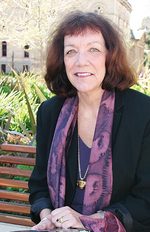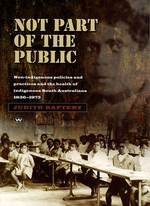Indigenous health still being hurt by policy
 Public Health Public Health
Dr Judith Raftery is a firm believer that we need to confront our past in order to make informed decisions about a better future. A Visiting Senior Lecturer in Public Health at the University of Adelaide, Dr Raftery introduced a historical perspective to the teaching of public health when she was first appointed to the discipline in 1989. She was the first person to introduce a course on Aboriginal Health Policy at the University, at a time when almost nothing about indigenous health was being taught. Almost two decades later, Dr Raftery has published a book dealing with the impact of non-indigenous policies and practices on the health of South Australia's indigenous people. The book deals with colonisation until the policy of self-determination in 1973, a period that has helped to shape current trends and issues in Aboriginal health. Titled Not Part of the Public - Non-indigenous policies and practices and the health of indigenous South Australians 1836-1973, the book is a must for anyone wanting to learn more about the policies that have impacted on South Australia's indigenous population, as well as those looking for a possible way forward. "History informs us," Dr Raftery said. "There is still a lot of ignorance among the community - including among policy makers - about the impact successive governments and policies have had on Aboriginal people. That's a very strong reason for writing the book. "It's not about blame; people in the past didn't have the insights that we have now into what contributes to the health of populations. What I'm aiming to do with this book is to help bring to life the issues, and provide some hope for the future." These issues include the understanding that political decisions and choices are fundamental determinants of people's health. Dr Raftery said there was increasing evidence that social and economic inequalities have a major impact on the health of populations. "Over successive years, Aboriginal people did not have the same rights to public goods and services. They [Aboriginal people] had essentially been constructed by government and society as not being part of the public, and that has resulted in marginalisation and the worst health status in the country. "The influence of this was determined by the spread of white settlement. From 1836, in Adelaide itself, Aboriginal people rapidly became paupers, vagrants, beggars. Hunting grounds disappeared on the Adelaide Plains. Fishing grounds were depleted and damaged. "They were also subject to diseases - smallpox, venereal disease and other infectious diseases - to which they had never been exposed before. However, ultimately their health was damaged by losing the capacity to live independently." Dr Raftery said this history is not a thing of the past: it continues to impact on the present. "There is a myth of the level playing field in this country," she said. "The current Federal Government promotes this myth, and has a kind of 'pull yourselves up by your bootstraps' attitude. This might tap into the views of many Australian voters, but unfortunately it doesn't match reality. "The problem is, indigenous populations have been so damaged, so dysfunctional, and so removed from the rest of the community. It's not a case of just helping them to climb a bit further up the ladder - in many cases, they don't have access to the ladder," she said. "There is increasing evidence that we have an unequal society. If we don't intervene politically to address this, health outcomes will continue to be spread unevenly throughout the community. "Indigenous people need to be included as part of the public in every way - though that should not be misread as a plea for uniformity. Many indigenous people are proud of and wish to retain their cultural distinctiveness." Not Part of the Public is published by Wakefield Press and is available at a recommended retail price of $39.95. Story by David Ellis
|






